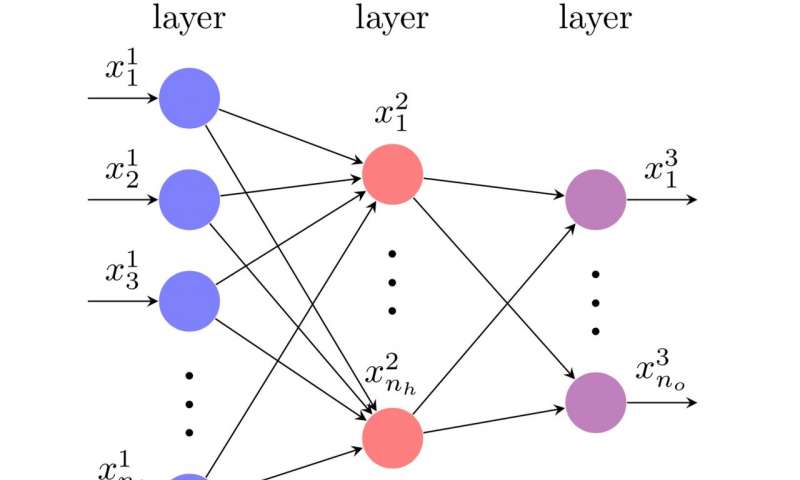One of my recent studies at the University of Cambridge showed that a unique deep-learning algorithm (Alchemite) can accurately predict physical properties of alkanes and outperform several physico-chemical/thermodynamic methods.
Copyright by sciencex.com
 Lubricants are an essential component in industry and are widely used. They can protect surfaces from wear, reduce friction, transfer heat, and ensure the smooth functioning of mechanical devices. Given that lubricants are predominantly mixtures of alkanes, it is unclear whether contemporary lubricant formulations are optimal. Predicting the physical properties of alkanes and understanding the relationship between lubricant performance and alkane structure would facilitate the development of computationally derived optimal base oils.
Lubricants are an essential component in industry and are widely used. They can protect surfaces from wear, reduce friction, transfer heat, and ensure the smooth functioning of mechanical devices. Given that lubricants are predominantly mixtures of alkanes, it is unclear whether contemporary lubricant formulations are optimal. Predicting the physical properties of alkanes and understanding the relationship between lubricant performance and alkane structure would facilitate the development of computationally derived optimal base oils.
One of my recent studies at the University of Cambridge showed that a unique deep-learning algorithm (Alchemite) can accurately predict physical properties of alkanes and outperform several physico-chemical/thermodynamic methods.
The study, published in Fluid Phase Equilibria , implemented artificial neural networks that exploit property-property correlations to predict physical properties of alkanes.
The deep-learning algorithm inputs the molecular structure of alkanes to predict the boiling point, heat capacity and vapor pressure as a function of temperature.
The results reproduced by this algorithm are significantly more accurate and consistent than those reproduced by other methods.
By combining sparse experimental data with molecular dynamics simulations to predict physical properties of alkanes, the algorithm can identify and speed up the identification of alkanes to be used for lubricant base oils with superior physical properties.
Tthe deep-learning tool we developed, Alchemite, is not only capable of predicting physical properties of alkanes, but accurately estimates intractable properties like density and shear viscosity.
Thank you for reading this post, don't forget to subscribe to our AI NAVIGATOR!
Alchemite could enable industries specialized in material formulations to substantially optimize their processes and yield better and faster results.
Our study serves as a solid platform from which to further investigate physical properties of alkanes. This generic neural network architecture merges sparse experimental data with molecular dynamics simulations to predict physical properties of alkanes, particularly intractable properties like shear viscosity and density, enabling us to identify the alkanes that could be components for lubricant base oils with superior physical properties.
In summary, our results show that machine learning is a very efficient approach when trying to predict the physical properties of alkanes, or any other structure, for that matter. This approach has been applied to other industries and fields, including drug discovery, aerospace, automotive, chemistry, and batteries.
Machine learning has the potential to accelerate R&D processes through guided experimentation for the discovery and optimization of new materials, thereby reducing costs and shortening the time to market.
Read more -sciencex.com


One of my recent studies at the University of Cambridge showed that a unique deep-learning algorithm (Alchemite) can accurately predict physical properties of alkanes and outperform several physico-chemical/thermodynamic methods.
Copyright by sciencex.com
One of my recent studies at the University of Cambridge showed that a unique deep-learning algorithm (Alchemite) can accurately predict physical properties of alkanes and outperform several physico-chemical/thermodynamic methods.
The study, published in Fluid Phase Equilibria , implemented artificial neural networks that exploit property-property correlations to predict physical properties of alkanes.
The deep-learning algorithm inputs the molecular structure of alkanes to predict the boiling point, heat capacity and vapor pressure as a function of temperature.
The results reproduced by this algorithm are significantly more accurate and consistent than those reproduced by other methods.
By combining sparse experimental data with molecular dynamics simulations to predict physical properties of alkanes, the algorithm can identify and speed up the identification of alkanes to be used for lubricant base oils with superior physical properties.
Tthe deep-learning tool we developed, Alchemite, is not only capable of predicting physical properties of alkanes, but accurately estimates intractable properties like density and shear viscosity.
Thank you for reading this post, don't forget to subscribe to our AI NAVIGATOR!
Alchemite could enable industries specialized in material formulations to substantially optimize their processes and yield better and faster results.
Our study serves as a solid platform from which to further investigate physical properties of alkanes. This generic neural network architecture merges sparse experimental data with molecular dynamics simulations to predict physical properties of alkanes, particularly intractable properties like shear viscosity and density, enabling us to identify the alkanes that could be components for lubricant base oils with superior physical properties.
In summary, our results show that machine learning is a very efficient approach when trying to predict the physical properties of alkanes, or any other structure, for that matter. This approach has been applied to other industries and fields, including drug discovery, aerospace, automotive, chemistry, and batteries.
Machine learning has the potential to accelerate R&D processes through guided experimentation for the discovery and optimization of new materials, thereby reducing costs and shortening the time to market.
Read more -sciencex.com
Share this: